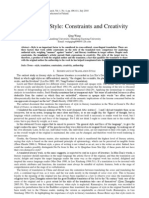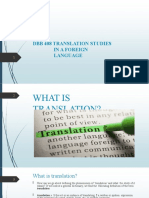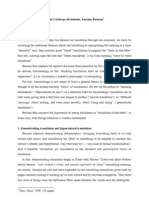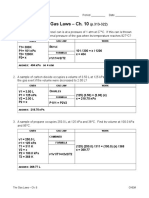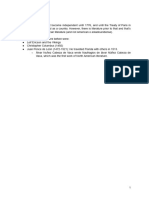Berman, Antoine
Berman, Antoine
Uploaded by
Aligmat GonzalesCopyright:
Available Formats
Berman, Antoine
Berman, Antoine
Uploaded by
Aligmat GonzalesOriginal Description:
Copyright
Available Formats
Share this document
Did you find this document useful?
Is this content inappropriate?
Copyright:
Available Formats
Berman, Antoine
Berman, Antoine
Uploaded by
Aligmat GonzalesCopyright:
Available Formats
ANTOINE BERMAN (19421991)
Translation and the Trials of the Foreign
Keywords:
deforming forces, deforming tendencies, the foreign, literal translation, textual deformation
1. Author information
Antoine Berman (19421991) was a French translator specializing in translating German and
Hispanic literature into French. He was also a well-known theorist of translation whose name
is to be linked with such concepts as foreignization, ethics of translation and literal (but not
word-for-word) translation. He contributed to the TS as a fierce defender of the foreign in
translation and influenced other scholars like Lawrence Venuti who translated his famous
essay Translation and the Trials of the Foreign (1985).
2. Abstract
The article begins with the introduction of the notion of translation as the trial of the foreign
in the context of literary translations, which is separated from non-literary translations and
differences between these two are pointed. Berman claims that the former are much more
liable to the so called naturalization which causes the loss of essence of the work, the
foreign.
Then, the author examines the system of textual deformation in translated literature and
discloses to the reader the reasons why the translator is never free of deforming forces: the
ethnocentric structure of every culture and language as well as long tradition of such an
approach has made them inherent to every translation.
Next, the twelve deforming forces or tendencies are analysed in separate subchapters and
illustrated with examples taken from translations of great novels. These tendencies are:
1
rationalization, clarification, expansion, ennoblement and popularization, qualitative
impoverishment, quantitative impoverishment, the destruction of rhythms, the destruction of
underlying networks of signification, the destruction of linguistic patternings, the destruction
of vernacular networks or their exoticization, the destruction of expressions and idioms and
the effacement of the superimposition of languages.
Having described the deforming forces, the author presents the gist of the article: the essence
of the translating is not only the restitution of meaning but also labour on the form of the
translated text. This, in turn, produces more faithful translation preserving the sense,
signification and connotations that enable full understanding of the work.
3. Terminology
Source text term
Meaning
Term in Polish
cultivated language
a dominant language which is widely spoken, jzyk rozwinity
rich in vocabulary and may be refined
deforming forces
factors that cause the translated text to be czynniki
inaccurate when compared to the original deformujce
text; among them there are: rationalization,
clarification, expansion, ennoblement and
popularization, qualitative impoverishment,
quantitative impoverishment, the destruction
of rhythms, the destruction of underlying
networks of signification, the destruction of
linguistic patternings, the destruction of
vernacular networks or their exoticization, the
destruction of expressions and idioms and the
effacement
of
the
superimposition
of
languages
the foreign
all the components of the source text that obco
would be perceived by the receiver of its
translation as foreign, strange or peculiar
literal translation
the word literal is understood by the author as przekad literalny
attached to the letter (of works) and not only
to the meaning
textual deformation
deformation that is present in the translated deformacja tekstu
text and is the result of deforming forces
vernacular language
a language that has a local character; it may jzyk lokalny
be a dialect, jargon or slang
4. Methodology
The author bases his observations on his professional experience as a translator, primarily
of Latin American literature into French. He created the list of deforming forces on the basis
of the examples taken from the translations of classic novels.
He emphasizes that his analysis is provisional and, to be systematic, it requires the
contribution of translators of other works from and into other languages and the cooperation
of linguists and poets as well as psychoanalysts. He adds also that the negative analytic should
be supplemented by the positive one which would study the operations that limit the
deformation. Nevertheless, the number of examples taken from different literary works
translated by various authors cause the results of the analysis and the conclusion to be quite
reliable.
5. Links with other publications on the subject
Berman, A. 1992. The Experience of the Foreign: Culture and Translation in Romantic
Germany. Albany: State University of New York Press.
Schleiermacher, F. 1992. On the Different Methods of Translating, in Andr Lefevre (ed.),
Translation/History/Culture. London. New York: Routledge.
Venuti, L. 1995. The Translators Invisibility: A History of Translation. London. New York:
Routledge.
3
6. Critical commentary
The author presents his views in a logical, structured and convincing way, pointing out the
causes and results of what he calls textual deformation. His observations seem to be accurate
and quite interesting. I agree that foreignization is the best strategy in the translation of great
classic prose and that the tendencies towards domestication may oversimplify its meaning and
destroy the charm of the foreignness. Nevertheless, I am not convinced whether foreignization
should be applied in the translation of each type of literature. In the case of lighter reading for
less sophisticated readers, a certain level of naturalization or even domestication seems to be
justified. It should be added that Bermans theory cannot be applied beyond the translation of
literature. Still, Berman draws our attention to a very important problem and his analysis may
contribute to the rise of quality of literary translation.
7. Quotations to remember the text by
Unfortunately, a vernacular clings tightly to its soil and completely resists any direct
translating into another vernacular. Translation can occur only between cultivated
languages. An exoticization that turns the foreign from abroad into the foreign at home winds
up merely ridiculing the original (Berman 2000: 294).
All translation is, and must be, the restitution of meaning (Berman 2000: 297).
8. References
Berman, A. 2000. Translation and the Trials of the Foreign, in: Lawrence Venuti (ed.), The
Translation Studies Reader. London: Routledge. 284297.
pn
You might also like
- Translating Cultures. Translating Iran. Domestication and ForeignizationDocument14 pagesTranslating Cultures. Translating Iran. Domestication and Foreignizationmiss_barbarona100% (2)
- Literary Translation: A Practical GuideFrom EverandLiterary Translation: A Practical GuideRating: 4 out of 5 stars4/5 (8)
- Venuti - Retranslations - The Creation of ValueDocument10 pagesVenuti - Retranslations - The Creation of ValueClarissa RosasNo ratings yet
- Songwriters Playground - Innovative Exercises in Creative SongwritingDocument162 pagesSongwriters Playground - Innovative Exercises in Creative SongwritingWmPerryNo ratings yet
- From Brown Girl DreamingDocument14 pagesFrom Brown Girl DreamingDiego Armando Escribá VásquezNo ratings yet
- Peter Newmark 1977Document18 pagesPeter Newmark 1977马宁No ratings yet
- 2 Seatwork - Observing The Language of Research, Campaigns, and AdvocaciesDocument57 pages2 Seatwork - Observing The Language of Research, Campaigns, and AdvocaciesAligmat Gonzales100% (2)
- What Superstitious Beliefs Do You Still Believe In? What Traditional Practices Do You Still Practice at Home?Document40 pagesWhat Superstitious Beliefs Do You Still Believe In? What Traditional Practices Do You Still Practice at Home?Aligmat GonzalesNo ratings yet
- ATS - Contextual Theology SyllabusDocument4 pagesATS - Contextual Theology SyllabusAts ConnectNo ratings yet
- Bodhi's Guide To The Optimal Inquisitor v. 1.0Document57 pagesBodhi's Guide To The Optimal Inquisitor v. 1.0Test100% (2)
- The Role of TranslatorDocument13 pagesThe Role of TranslatorВікторія АтаманюкNo ratings yet
- Teorie RezumatDocument23 pagesTeorie RezumatAndreea Cristina TrașcăNo ratings yet
- Types of TranslationDocument16 pagesTypes of TranslationSaachi GroverNo ratings yet
- diploma - копDocument38 pagesdiploma - копYana LalayanNo ratings yet
- Theories of Translation by Jeremy MundayDocument13 pagesTheories of Translation by Jeremy MundayRatnaNo ratings yet
- Carlos G. Tee Translators Role As Intermediaires in Comparative Literature 2014 PDFDocument21 pagesCarlos G. Tee Translators Role As Intermediaires in Comparative Literature 2014 PDFAidaNo ratings yet
- Chapter Ii)Document9 pagesChapter Ii)Anna IsaverdyanNo ratings yet
- Dialect and Point of ViewDocument22 pagesDialect and Point of ViewKenny BosmanNo ratings yet
- Fidelity Vs TransparencyDocument2 pagesFidelity Vs TransparencyMauricio Coitiño Translations75% (4)
- Berthele Twain Jim Translation Dialect GermanDocument26 pagesBerthele Twain Jim Translation Dialect GermanKenny BosmanNo ratings yet
- Four Rulfian Voices Translation MexicanismsDocument11 pagesFour Rulfian Voices Translation MexicanismsÁngel MolinaNo ratings yet
- Hatim and Mason The Semiotic Level of Context and Discourse 2Document12 pagesHatim and Mason The Semiotic Level of Context and Discourse 2amany100% (3)
- The Translation Studies ReaderDocument60 pagesThe Translation Studies Readerhassani100% (1)
- Teaching English Through TranslationDocument5 pagesTeaching English Through TranslationJonathan VidesNo ratings yet
- Would You Agree That The Writer and Translator Are Co-Authors of A Work Produced?Document3 pagesWould You Agree That The Writer and Translator Are Co-Authors of A Work Produced?Varshita RameshNo ratings yet
- Types and Methods of TranslationDocument8 pagesTypes and Methods of TranslationmadznaNo ratings yet
- Research On The Application of Domestication and Foreignization in Literary TranslationDocument6 pagesResearch On The Application of Domestication and Foreignization in Literary Translationzarakeith24No ratings yet
- Heltai Pál: A Fordító És A Nyelvi Normák I.Document28 pagesHeltai Pál: A Fordító És A Nyelvi Normák I.Vajda FlóraNo ratings yet
- Book Review Companion To Translation StudiesDocument3 pagesBook Review Companion To Translation StudiesFrank MollejonNo ratings yet
- The Literary Translator and The Concept of FidelityDocument16 pagesThe Literary Translator and The Concept of FidelityAzenithAlmoradieNo ratings yet
- 10 2307@23110425Document35 pages10 2307@23110425ikrambelfegasNo ratings yet
- DictionaryTranslationaInterpretation FinalDocument161 pagesDictionaryTranslationaInterpretation Finalmalicus100% (1)
- 10 Chapter 4Document18 pages10 Chapter 4EASSANo ratings yet
- A Brief Summary of H. TransilationDocument9 pagesA Brief Summary of H. Transilationmoniz Rodriguês CumbaneNo ratings yet
- A Dictionary of Translation and Interpreting - Laver, MasonDocument161 pagesA Dictionary of Translation and Interpreting - Laver, MasonkasiekkkNo ratings yet
- Lecture2 LTDocument4 pagesLecture2 LThusseinabdulateefzeri4No ratings yet
- The History and The Origin of The Theory of Translation. Its Place Among Other SciencesDocument44 pagesThe History and The Origin of The Theory of Translation. Its Place Among Other SciencesMarina MisiatsNo ratings yet
- Eng 4104+ 4112Document6 pagesEng 4104+ 4112mamaythuwin7No ratings yet
- The Stylistic Peculiarities of Types of TranslationDocument22 pagesThe Stylistic Peculiarities of Types of TranslationAnna ManukyanNo ratings yet
- UnnaturalnessDocument6 pagesUnnaturalnessChau NguyenNo ratings yet
- Cap 2 Translator TraitorDocument25 pagesCap 2 Translator TraitorAnonymous vyZl6A100% (2)
- Translator's Interventions in The Iraqi Arabic Version of Eugen Ionesco's La LeçonDocument9 pagesTranslator's Interventions in The Iraqi Arabic Version of Eugen Ionesco's La LeçonGeorgiana NicoareaNo ratings yet
- 1 PBDocument8 pages1 PBMimiNartaNo ratings yet
- Translation and Nation: Negotiating "China" in the Translations of Lin Shu, Yan Fu and Liang QichaoFrom EverandTranslation and Nation: Negotiating "China" in the Translations of Lin Shu, Yan Fu and Liang QichaoNo ratings yet
- Venuti - The Scandals of TranslationDocument3 pagesVenuti - The Scandals of TranslationNusa50% (2)
- Translation Theories: Metaphrase and ParaphraseDocument3 pagesTranslation Theories: Metaphrase and ParaphraseAya TahaNo ratings yet
- Translation Is To Render The Meaning of A Text Into Another Language in The Way That The Author Intended The TextDocument2 pagesTranslation Is To Render The Meaning of A Text Into Another Language in The Way That The Author Intended The TextRovin Jae Esguerra100% (1)
- Notes 1Document7 pagesNotes 1Seemal SheikhNo ratings yet
- Problems in Translating TextDocument19 pagesProblems in Translating TextSyadza SalwaNo ratings yet
- Culture in LanguageDocument7 pagesCulture in Languageabdul raufNo ratings yet
- Translating Style: Constraints and Creativity: Qing WangDocument6 pagesTranslating Style: Constraints and Creativity: Qing Wangmikewarwick87No ratings yet
- Translating Literary Prose-Problems and Solutions: AbstractDocument23 pagesTranslating Literary Prose-Problems and Solutions: AbstractEASSANo ratings yet
- The Philosophy of Language For Much of The Twentieth CenturyDocument2 pagesThe Philosophy of Language For Much of The Twentieth CenturyEstera ButnariucNo ratings yet
- Translation and IdentityDocument6 pagesTranslation and IdentityZINOHOUNo ratings yet
- What Every Novice Translator Should KnowDocument10 pagesWhat Every Novice Translator Should KnowJimena ChambiNo ratings yet
- DBB 408 Translation Studies in A Foreign LanguageDocument21 pagesDBB 408 Translation Studies in A Foreign LanguageMilenia Reyes100% (1)
- Ministry of Education of The Republic of MoldovaDocument66 pagesMinistry of Education of The Republic of MoldovaAntonina UzunNo ratings yet
- Berman Auberge Du LointainDocument7 pagesBerman Auberge Du Lointainapi-3756013100% (1)
- Translatability of ProverbsDocument4 pagesTranslatability of Proverbsanginehsarkisian100% (1)
- Trans-Kom 08 02 05 Giaber Novels.20151211Document32 pagesTrans-Kom 08 02 05 Giaber Novels.20151211Andrzej ŁydaNo ratings yet
- Literary TranslationDocument17 pagesLiterary TranslationlqzhacNo ratings yet
- Maeng 12Document9 pagesMaeng 12Shikha VermaNo ratings yet
- Problems of EquivalenceDocument5 pagesProblems of EquivalenceYasir BukhariNo ratings yet
- Raspunsuri Seminar I TerminologieiDocument5 pagesRaspunsuri Seminar I TerminologieiMissC0RANo ratings yet
- Translation Theories Elements Types Principles DefinitionDocument7 pagesTranslation Theories Elements Types Principles DefinitionalexandraNo ratings yet
- 1 Lecture - Observing The Language of Research, Campaigns, and AdvocaciesDocument51 pages1 Lecture - Observing The Language of Research, Campaigns, and AdvocaciesAligmat Gonzales88% (8)
- MAEL - Ang Baybay, Ang Babaye, Ang Mga BinalaybayDocument14 pagesMAEL - Ang Baybay, Ang Babaye, Ang Mga BinalaybayAligmat GonzalesNo ratings yet
- MAEL - Ecofeminist Invitations in The Works of Sindiwe Magona PDFDocument10 pagesMAEL - Ecofeminist Invitations in The Works of Sindiwe Magona PDFAligmat GonzalesNo ratings yet
- The Maze and The Myth: Learning CompetencyDocument1 pageThe Maze and The Myth: Learning CompetencyAligmat Gonzales100% (1)
- 101 Ways To Be Lady: Analyzing Jamaica Kincaid's Girl Using The Formalist LensDocument2 pages101 Ways To Be Lady: Analyzing Jamaica Kincaid's Girl Using The Formalist LensAligmat GonzalesNo ratings yet
- Chapter 5 - Recommendations (Edited)Document9 pagesChapter 5 - Recommendations (Edited)Aligmat GonzalesNo ratings yet
- Factors Affecting Grade 12 STEM Course Choice Preliminary PagesDocument12 pagesFactors Affecting Grade 12 STEM Course Choice Preliminary PagesAligmat GonzalesNo ratings yet
- MAEL - Francisco Arcellana's The Mats in Pedagogical Stylistics (Stylistics) PDFDocument15 pagesMAEL - Francisco Arcellana's The Mats in Pedagogical Stylistics (Stylistics) PDFAligmat GonzalesNo ratings yet
- MAEL - The Sound of Poetry (Stylistics)Document14 pagesMAEL - The Sound of Poetry (Stylistics)Aligmat GonzalesNo ratings yet
- Verb Tense Chart Based On Azar: Understanding & Using English GrammarDocument1 pageVerb Tense Chart Based On Azar: Understanding & Using English GrammarHanna0% (1)
- Teknolohiya Sang GugmaDocument10 pagesTeknolohiya Sang GugmaAligmat Gonzales100% (2)
- Factors Affecting Grade 12 Senior High School Students For Pursuing Medical and Health Care Courses in CollegeDocument51 pagesFactors Affecting Grade 12 Senior High School Students For Pursuing Medical and Health Care Courses in CollegeAligmat GonzalesNo ratings yet
- 2 Namingsimplehydrocarbons Ws KeyDocument2 pages2 Namingsimplehydrocarbons Ws KeyAligmat Gonzales100% (1)
- CB8 B 5G 7G: Answer Key Section A: Complete The Chart Using A Periodic Table To Help YouDocument3 pagesCB8 B 5G 7G: Answer Key Section A: Complete The Chart Using A Periodic Table To Help YouAligmat GonzalesNo ratings yet
- Tough Gas Laws WorksheetDocument2 pagesTough Gas Laws WorksheetAligmat GonzalesNo ratings yet
- Erosion of SoilsDocument21 pagesErosion of SoilsAligmat Gonzales0% (1)
- 101 Ways To Praise A ChildDocument1 page101 Ways To Praise A ChildAligmat GonzalesNo ratings yet
- Beyond ForgettingDocument3 pagesBeyond ForgettingAligmat GonzalesNo ratings yet
- 1586 5555 1 PBDocument17 pages1586 5555 1 PBAligmat GonzalesNo ratings yet
- Mapeh 1st Grading TestDocument2 pagesMapeh 1st Grading TestAlleli Faith Leyritana100% (1)
- Training InstitutesDocument1 pageTraining InstitutesMohsin MapariNo ratings yet
- Sri Chaitanya Bhagavat - Adi Lila Chapter OneDocument8 pagesSri Chaitanya Bhagavat - Adi Lila Chapter OnePradeep Ranjan Behera100% (1)
- How Frog Went To HeavenDocument12 pagesHow Frog Went To Heavenjack thegoodNo ratings yet
- An Analysis of Sentence in Novel'S Snow by Orhan PamukDocument6 pagesAn Analysis of Sentence in Novel'S Snow by Orhan PamukAbi Teuku TNo ratings yet
- (Editors of Salem Press) Introduction To LiteraryDocument290 pages(Editors of Salem Press) Introduction To LiteraryViolet Flower0% (2)
- EscenografiaDocument48 pagesEscenografiaJosé OlarteNo ratings yet
- PDF Fairy Tale SyllabusDocument3 pagesPDF Fairy Tale Syllabusapi-260001816No ratings yet
- Dissertation AllDocument50 pagesDissertation Alldasd6343No ratings yet
- LigeiaDocument6 pagesLigeiaSeventy-sevenNo ratings yet
- Themes: Guilt and RedemptionDocument7 pagesThemes: Guilt and RedemptionOmar AshrafNo ratings yet
- CinderellaDocument1 pageCinderellaemanNo ratings yet
- 1 - Colonial PoetryDocument6 pages1 - Colonial PoetrypepelopezrequenaNo ratings yet
- Class 10 English For Ann Gregory BeautifullyDocument20 pagesClass 10 English For Ann Gregory BeautifullyAzra BaigNo ratings yet
- CPAR ReviewerDocument11 pagesCPAR ReviewerAngelo PeraltaNo ratings yet
- The Utopic Structure of The TempestDocument11 pagesThe Utopic Structure of The TempestExoplasmic ReticulumNo ratings yet
- Purnanandalahari p2D5Document65 pagesPurnanandalahari p2D5वाधूलं कण्णन् कुमारस्वामि100% (3)
- Kenya KE-VDO-Own-Kantaria-Station KE-3PL-Cossim Kakamega-StationDocument6 pagesKenya KE-VDO-Own-Kantaria-Station KE-3PL-Cossim Kakamega-StationbreastpumpkeNo ratings yet
- 9B Subiect +barem PDFDocument5 pages9B Subiect +barem PDFCristinaNo ratings yet
- A Poet From Hollywood: Love, Insanity, Stephen Gyllenhaal, and The Creative ProcessDocument225 pagesA Poet From Hollywood: Love, Insanity, Stephen Gyllenhaal, and The Creative ProcessCantara ChristopherNo ratings yet
- Cot #2Document3 pagesCot #2Chique LabuguenNo ratings yet
- Book Review On Noli Me Tangere: Purpose of The TextDocument4 pagesBook Review On Noli Me Tangere: Purpose of The TextKyla Francine Tiglao100% (1)
- In The Time of The ButterfliesDocument6 pagesIn The Time of The Butterfliesapi-269737321No ratings yet
- Semi Charmed Life PDFDocument2 pagesSemi Charmed Life PDFaren0214No ratings yet
- Fif4u New Syllabus To PostDocument38 pagesFif4u New Syllabus To Postapi-246655740No ratings yet
- Scope and Sequence High School English 9Document16 pagesScope and Sequence High School English 9Louie Jay Cañada AbarquezNo ratings yet


















































